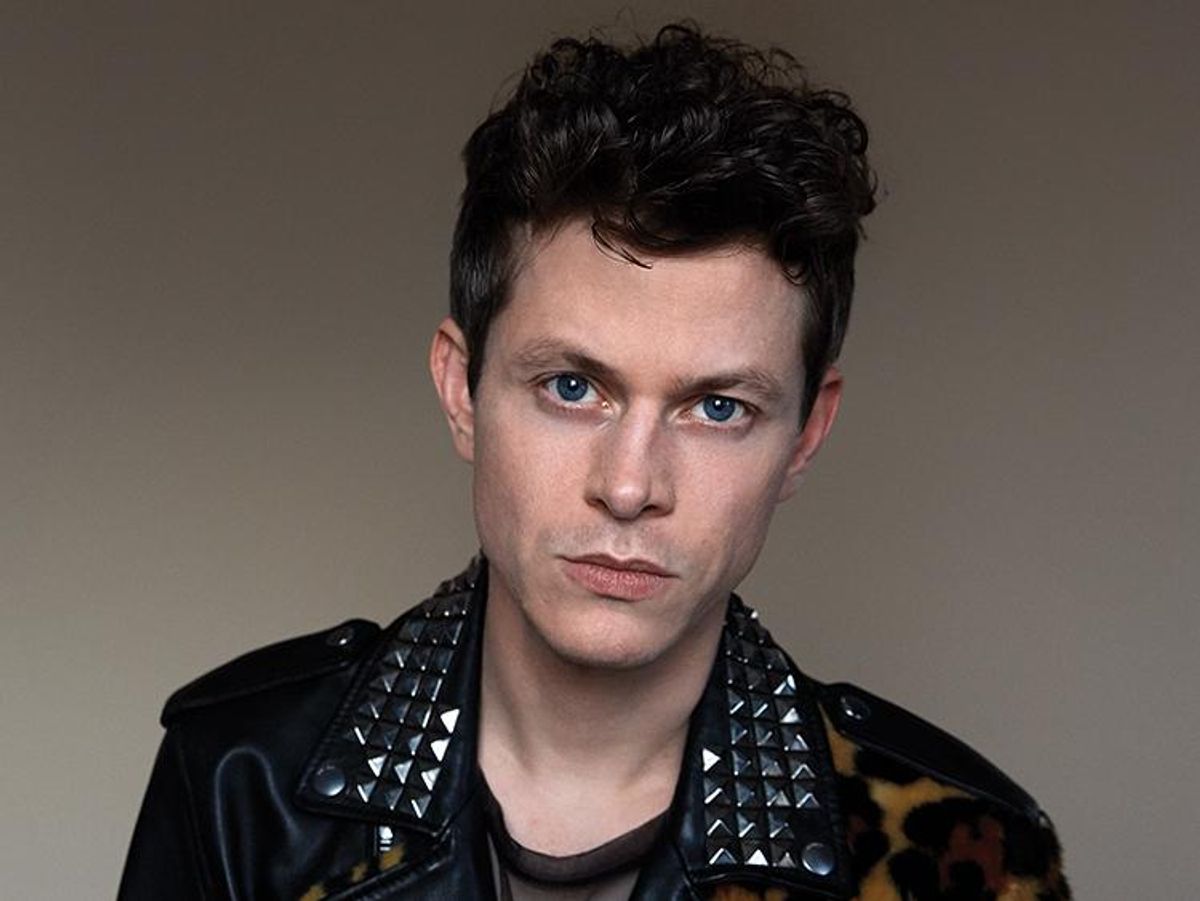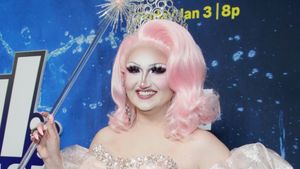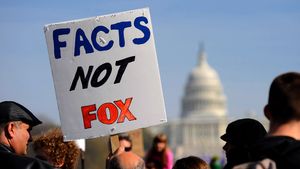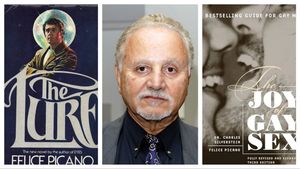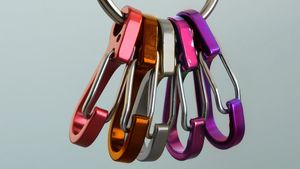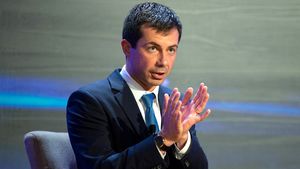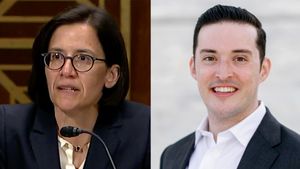Looking back, Perfume Genius's 2014 queer anthem "Queen" feels prescient. It was a defiant, flamboyant piece of modern glam rock for darker days--all twinkling stars, sashaying hips, and roaring thunder. Its answer to bigotry and oppression was glitter and venom. Now you could picture the singer torching the White House to it.
"I wasn't really singing that song for anybody who would have come to my shows," says the 35-year-old Seattle native, born Mike Hadreas. "It was more for the people who weren't there."
The songs on his superb new album, No Shape, are neither critical nor confrontational. Many are celebratory and exhilarating, the sound of Hadreas shedding his body like a chrysalis and soaring into the unknown. "I'm no longer interested in convincing people or trying to explain things to them," he says. "I feel more passionate about building up people who are already on my side."
Related | Stream Perfume Genius' New Album, No Shape
If "Queen" was feisty and flippant, the No Shape highlight "Just Like Love" is lush and uplifting, almost naive in its simplicity. There's a reason for that: The track, a 1950s-style ballad that conjures images of Neil Sedaka swooning in a tiki bar, is a tribute to the innocence and boundlessness of childhood. "I wrote it after watching this video of a boy who had fashioned a dress out of a blanket and was doing a runway walk in his living room," Hadreas says. "His mom was cheering him on. There was something so beautiful and pure about it, but it also made me sad. I thought about how in a few years his smile could be gone, or that he would maybe start hardening up." In the refrain Hadreas sings, "For child, you walk just like love," before urging him, "Baby, hold on and stare them down."

Full Look: Raf Simons
No Shape is Hadreas's most assured, eclectic work to date. His influences span the pop and folk canons--Kate Bush, Sade, Nico, Elvis, Springsteen--but what the songs share is a desire for transcendence. "My biggest fear is being basic, like nothing I do really matters," says Hadreas. "I feel like I'm just trying to figure out how to escape and exist and live my life the right way at the same time."
This shines through on the record's stunning, intimate closer. "Alan" is dedicated to Alan Wyffels, Hadreas's bandmate and partner of eight years. For Hadreas, its plainspoken lines "I'm here" and "Everything is all right" are as bold as any of the lyrics in "Queen." Expressing himself so openly was uncomfortable but necessary. "It almost felt audacious to say that kind of thing out loud," says Hadreas.
Listening to "Alan," you can picture the couple in bed, embracing as they drift into sleep. It's Hadreas's way of saying that the closest we may ever come to leaving our own bodies is lying next to someone else's.
We spoke to Hadreas about reality versus fantasy, the beauty of death, and the magic of donning Gloria Estefan drag as a 7-year-old.
OUT: You've said No Shape is your take on rock 'n' roll. How did you manage to make a rock 'n' roll record that's also a very Perfume Genius record?
Perfume Genius: I can't really escape it. Sometimes I worry if I'm writing something and the chords and melody are very pop that it's gonna sound too slick. But then I think about how strange my voice is and realize that I'm never fully in danger of that. I feel the same way about the whole rock 'n' roll thing: Even if I emulate certain ways of singing or certain poses from singers I loved growing up, I'm never going fully in that direction, because I'm never fully comfortable onstage, and my voice is just pure. There's always a crack in all of it.
How have your performances changed over the course of your four albums?
Now if I feel awkward, I just think of it as part of the performance, as opposed to something that makes me feel self-conscious or that makes me want to retreat into myself. I use it more as fuel.
You see your awkwardness as a strength.
Yeah. When you go to shows, you want to see a human up there onstage as much as you want them to be overblown. You want to see the shakes in their voice, something that makes it real. Even if I have an abundance of those shakes, I think it's helpful as opposed to something to fight against all the time.
Hey, even Beyonce's voice cracks sometimes.
Yes, absolutely! It just sounds like effort. I think everybody wants everything to sound so easy and natural all the time, but I like hearing people work really hard, seeing them really going for it.
You've said that with your previous album, Too Bright, you were writing songs at people, but with No Shape you're writing songs for people.
I think a lot of No Shape was about me trying to write in the moment--about how I feel--and not so much about stories and things that have already happened. The last album was reactive--I was simply fucking pissed off. This album is more for the people who come to my shows. Even though the songs are personal, when I was writing them I kept in mind the people I talked to after shows or who wrote me letters. I tried to frame the lyrics and songs in a way that was personal enough for them to get into the music, but that would also eventually be helpful to them.
You can really hear that on the track "Just Like Love." Your 2014 anthem "Queen" was defiant, but "Just Like Love" is inspiring, a queer celebration. Tell me about the message behind it.
With that song I was thinking a lot about when I was young, before I became self-aware and self-conscious about my instincts and what I was naturally drawn to and how I talked--you know, when I was pure and myself in a lot of ways. As you get older, you find out that some of those things you loved are not OK to love, or that they make you strange. But when I was young, I completely trusted myself when I got all my family together in the living room and performed three Gloria Estefan songs with, like, a towel wrapped around my head. [Laughs.] I was like, This is amazing. They are all lucky to be in the presence of me doing this number right now. It's so weird--to be 7 years old and to have that power over adults. And I knew there was maybe something weird about me, but I didn't know what yet. I didn't know how I was making them uncomfortable--I just knew that I was. I think you start carrying that feeling around pretty early. I just didn't care yet.
Tell me about your decision to name the record No Shape. It seems to tie in with its recurring theme, which is this notion of fleeing the body.
There are multiple tiers to that feeling for me. There's something really beautiful about the idea of transcending your body--something spiritual about the idea of unlocking yourself and being able to access warmth and joy that wasn't available to you before. There's also a sad underside to it. I grew up with Crohn's disease and felt like my body was betraying me all the time. I felt trapped inside of it, in a very physical way and even in a philosophical way, though I think that came later. I think "Wreath" is a joyous song about that, even though it's essentially about only finding peace when you die. That doesn't necessarily have to be a bad thing--there's something cathartic about singing about it in a really anthemic way. I've been listening over and over to "Any Day Now," a song Sam Cooke did with the Soul Stirrers. He sings, "Any day now, I'm coming home." He's talking about going to heaven, but he's calling it home. There aren't a lot of non-religious songs in which death is a homecoming or something sweet, so I liked the idea of finding my own way to think about that.

Full Look: Coach
We've talked before about this tension you experience of wanting to be comfortable and happy, but also feeling uncomfortable with the idea of stasis.
Well, being in the moment or just, like, existing is kind of counterintuitive to me. I've learned over the years that it's not that bad--it's actually rewarding and helps you to be a lot more grateful and put things into perspective. But I just don't feel wired for it. All the weird spirals in my head--there are bad ones, but there are good ones too--keep me in a sort of fantasy. What's going on in my head is a lot more dramatic than what's actually in front of me. I guess my other albums were about trying to figure out a way to exist and have that be just as dramatic and warm and sacred and spiritual and big as what I'm thinking about when I'm writing them.
I've been doing a lot of interviews for No Shape and talking about my house and my dog and my boyfriend, Alan. I enjoy talking about it, and of course they're an enormous part of the music, but it felt bigger, more magical, when I was actually writing these songs. Maybe I'm just defensive because I'm talking about all this domestic stuff, which seems like it would be such a boring thing to read. Maybe I'm trying to spice it up a little with some magic. [Laughs.] But I did love writing about a love that has been going on for a long time. There are so many songs about the beginning of love, and I liked writing something about being with someone for eight years that was just as epic, writing about how sacred and powerful that can be. So, as much as I want to fight against this whole domestic storyline, I guess that's essentially what the album is about.
But if some of these songs are simply about being in love and being domestic and supporting someone, that idea is wrapped in this fantastical world.
That's just way more fun. I was talking to somebody recently, and they don't believe in God essentially because of how they were taught God is. I totally understand that, but for me God is just a bunch of soothing ideas or, like, magic spells. [Laughs.] Anything that makes my life feel more fun, more meaningful, more magical--that's how I like things. Reality has always felt too... real. It felt locked into something cold and dark and clinical. I think that's essentially why I did drugs and drank in the beginning: because it made everything really big. I felt completely different. Every moment felt... epic, in a way. It eventually turned into a very different extreme--it swung to the other side--but even when it was really dark, I still preferred that to nothing or to somewhere in the middle. Even when the problems were big, I could really, deeply feel them, and I knew what the solution was because it was so clear. When I'm left on my own, everything's a little murky and way less exciting.
In a way, music saved you. After the drinking and the drugs became a problem, you were able to find another outlet that brought you a similar joy and sense of drama.
Yeah, and a place for all this fuzzy stuff in my brain to go. I've never gotten a handle of what that is, but there's a place for it to go and a direction for it to go in. It's like a true purpose I've never had before. I mean, the danger now is that I just put everything onto that. If that sweat and dirt goes away, I don't know what I'll do. But I'm certainly enjoying it now.
What was the premise behind the video for "Slip Away," the first single from No Shape? I could really see the influence of Kate Bush in it.
Very much so. I wanted to show a relationship between a man and a woman that was as epic as a romance but not necessarily romantic. I've had a lot of really powerful friendships with women in my life, and they're equally as important as my romantic relationships or those with my family. I knew Andrew [Thomas Huang], the director, would be able to show this. He makes entire worlds with his work, and he totally did that. I sent him a vague mood board, with styling and paintings and stuff like that, and he totally understood the spirit of the song. No matter how technical it got, the core of it was very triumphant and emotional. I've never trusted a director so much.
In the same way that Kate's videos are inextricable from her music, I feel like the video added a new dimension to the song.
Me too. I'm so proud of it. It has so much of the spirit of the song in it. It's beautiful.
You mentioned "Wreath," which is the most Kate Bush-ian song on the album and one of my favorites. I hope you release a video for that song.
We just did rehearsals with the band, and that's one of my favorite songs to practice live. It has an a cappella ending. Well, I mean, I'm the only one yodeling. [Laughs.]
Aside from Kate Bush, who were your influences while writing this record?
Prince, Sade, Bjork, Bob Dylan, Cocteau Twins, 1950s crooner ballads, any minor-key ballad, a lot of soundtracks, Angelo Badalamenti. There's this song by Iris DeMent, "My Life." It's beautiful--very emotional and pure. It influenced the last track, "Alan," in a way.
"Alan" is dedicated to your partner and bandmate, Alan Wyffels. What was it like writing such a personal song?
I played it for him when it was just a demo--it's not like I gave it to him fully formed as a gift or something. It feels like his song too. We recorded the album in two sessions in two weeks, and I wrote that song between the first and second session. I felt like the album needed a final song. He knew I was working on it when we were home, but he didn't know what it was, and I didn't tell him until after he'd heard it that I was naming the song after him. At first, I felt very... not nervous about it, but just saying, "We're all right" in a song felt almost cringe-y to me. [Laughs.] I kept asking him if it was like that Sally Field acceptance speech at the Oscars [in 1985]: "You like me! You really like me!" I was scared that a couple of lines in the song were like that. Like, am I confident enough to say, "We're all right"? To say, "I'm here" earnestly? But that's how I knew that I should say it: because it made me uncomfortable.
Bjork said something very similar about her breakup album Vulnicura--that writing such personal, plainspoken lyrics was very weird and terrifying for her.
Yeah, on my first couple of albums I wrote in a plainspoken way about things that had happened, but it wasn't about the emotions--it was about the story. The emotions were in between all the lyrics. But this album is a lot more about how I actually feel, which is a lot scarier. When you write that way, you feel like you have way less control, because there's not a tidy way to wrap things up. It's open-ended and confusing, a mix of good and bad. There's not an ending. It's just how you feel.
Photography: Alex Cayley
Styling: Grant Woolhead
